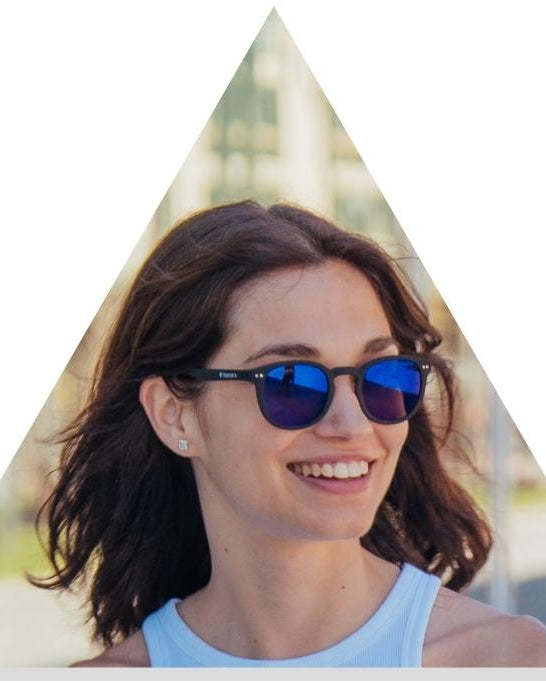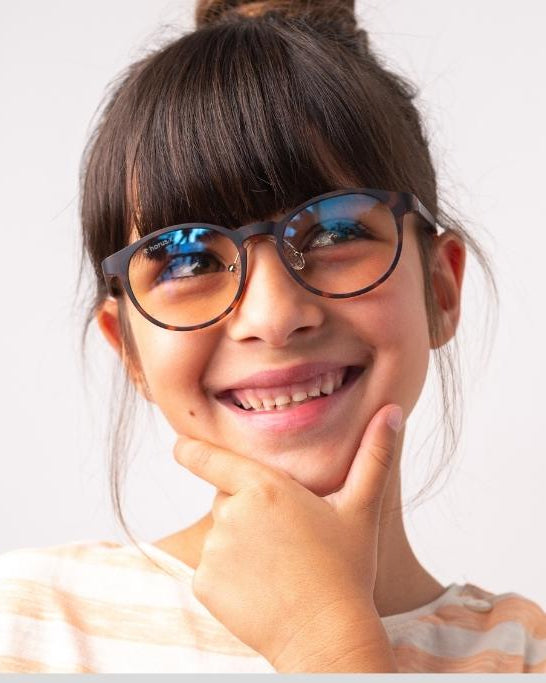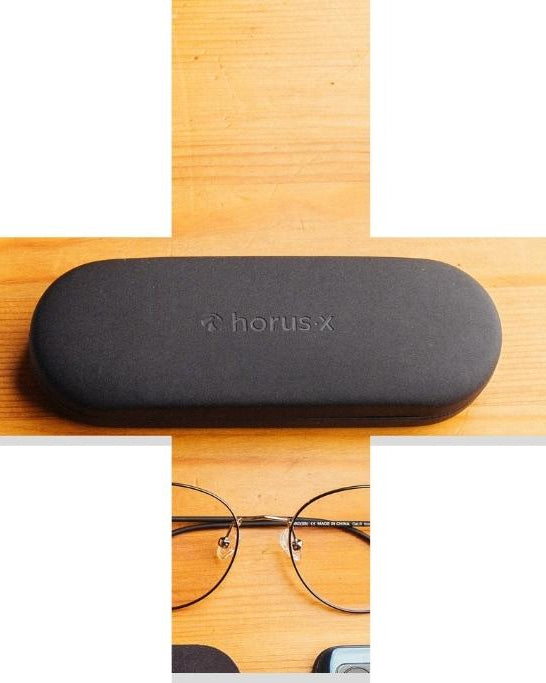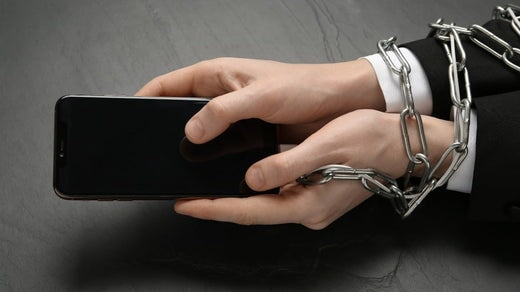Blue light, the invisible enemy that stalks you day and night. Through the mean streets of your screens, it’s always following… always watching.
Scared yet? Well, it is the spooky season!
For real though, blue light from the sun and LEDs can be dangerous, so knowing when and how to filter it is super important to your eye health.
What is blue light?
Blue light has been naturally present in sunshine since the dawn of time. So why is it suddenly a huge issue and massively criticized online? Is it really dangerous, or just a well-orchestrated marketing stunt? (Buy our glasses here! 😉)
Well, unfortunately for our eyes, it’s the fact that our exposure to blue light has massively increased over the last few decades that makes it dangerous.
Nowadays we come into regular, daily contact with artificially emitted blue light from a number of devices like cell phones, tablets, computers, televisions and LED bulbs.
Unless you live like a hermit of course, in which case you wouldn’t be reading this article anyway…

These artificial sources emit a concentrated light. It’s this intensity, coupled with regular exposure that leads to issues. For example, the average American spends 7 hours per day looking at a screen. And that’s not even including your exposure to LED lights.
If that doesn’t seem long to you, you’re part of the problem!
That being said, not all blue light is bad. It can be classified into two categories:
- Blue light, which is essential and beneficial for our eyes and bodies
- Blue light, which is harmful and which exposure to should be limited
The blue light you SHOULDN’T filter out
The “blue-turquoise” light that sits on the spectrum at 450 to 500 nanometers stimulates wakefulness and contributes to a healthy sleeping pattern. Dr. Charles Czeisler of Harvard Medical School highlighted as early as 1981 its importance in syncing our internal clock and establishing a circadian rhythm.
The natural light that wakes us in the morning lowers the level of melatonin in our bodies and allows us to wake naturally. In the evening, the production of this melatonin increases, allowing you to join the dreamlike kingdom of the Sandman; although hopefully not Neil Gaiman’s version.

Research has also shown that this "good" blue light boosts alertness, helps maintain good memory, improves your cognitive functions and improves your mood. A kind of super combo between carrot and cod liver oil that’ll keep you hoppier than Bugs Bunny. Although we can’t promise you’ll be able to see in the dark afterwards.
So, this kind of blue light can stay! It’s beneficial and useful to your overall sleep health.
The blue light you SHOULD filter out
Intense blue light sits on the spectrum between 380 to 450 nanometers, which is close to the UV end and has very short wavelengths. Overexposure to this type of blue light and you can start to mimic Homelander in The Boys.
Experts and ophthalmologists are becoming increasingly concerned about the effects of blue light. You can check out loads of studies performed by the National Library of Medicine here.
Plus, here’s what Web MD has to say, and surprisingly, they don’t jump straight to cancer for once!
There’s evidence blue light could lead to permanent vision changes. Almost all blue light passes straight through to the back of your retina. Some research has shown blue light may increase the risk of macular degeneration, a disease of the retina.
Research shows blue light exposure may lead to age-related macular degeneration, or AMD. One study found blue light triggered the release of toxic molecules in photoreceptor cells. This causes damage that may lead to AMD.
It’s therefore imperative this blue light radiation is filtered, since it can seriously impact both your short-term (dry eyes, headaches, computer vision syndrome) and long-term (AMD, damage to your retinas) health.

The effects of harmful blue light
The spectrum of blue light that’s closer to UV and with shorter wavelengths, can cause several health issues and problems.
The most common are:
- 😴 Impacting your sleep: Blue light is proven to block the secretion of melatonin, the sleep hormone. In high doses at the wrong times of day it directly impacts your sleeping pattern and therefore your health.
- 😵Digital eye strain, itchy eyes and headaches: Too long staring at screens without switching between long and short sight, can lead to all of these short-term health impacts.
- 👀 Age-related macular degeneration: This long-term consequence is becoming increasingly more apparent the more research is done. Much remains to be discovered and confirmed here, but the results on existing studies seem to suggest that this can be a serious long-term affect of overexposure to blue light.
In summary:
- ❤️Natural blue light: good for you and your eyes
- 💔 Modern LED lighting from screens: bad for you and your eyes. The intense lighting and short waves on this part of the spectrum has both short and long-term health consequences.
Don’t forget, it’s not essential to filter out every type of blue light.
Always remember:
- 🚫 380 to 430 nanometers is the ultra-harmful part of the blue light spectrum, and 430-450 nanometers is still pretty harmful. It’s important to block these blue light wavelengths.
- ✅ 450 to 500 nanometers is the happy healthy part of the blue light spectrum. There’s no need to block it and it actually has good benefits to your overall eye health and sleeping pattern.
PS: Beware of glasses and filters that don’t provide information on what types of blue light they’re actually blocking. You can request test results on their eyewear from independent laboratories. If they don’t have them, its usually a sign of poor quality and/or ineffective filtration.
Blue light: How & when to block it
Once we know that we should be protecting ourselves, the question becomes when and how?
📲Solution 1: Anti-blue light applications and integrated ‘night’ modes
Most new devices like computers, tablets and phones will come with the ability to change your screen’s brightness, or switch to ‘night’ mode. For one’s that don’t, apps will do the trick instead.
But this solution isn’t perfect, and there are some drawbacks, such as:
- Depending on the application, it might filter too much or not enough of the blue light spectrum. We’re not quite at the point technologically where the app can sort beneficial from harmful blue light. This is real life, not Tron.
- The color alteration can be too extreme and people end up looking more like Simpsons characters than regular humans.
- Doesn’t apply to all screen types or protect you from other harmful sources like LEDs.
😎Solution 2: Anti-blue light glasses
Blue light blocking glasses have lenses specially designed to absorb and reflect a specific portion of the harmful spectrum.
Therefore, their filtration is supposed to be precisely, laser-focused on eliminating all rays in the harmful spectrum of 380 to 450 nanometers.
But, depending on the brand, how efficient they are can vary. They’re supposed to focus precisely on this dangerous spectrum, but it can vary. Be careful to read the fine print, and don’t do a Ross and fall asleep halfway through.
At Horus X, our glasses promise the following:
- 🛡️ One of the best, if not the best filtration of the harmful blue light spectrum available.
- 🚀 Registered technology, Rocketman style.
- ⚪ Reduced color distortion.
- ❤️ Really stylish models

When should you wear blue light glasses?
Got a headache, struggle to sleep or suffer from eye fatigue? Well, why aren’t you wearing some already?! Listen to your body, it knows what it needs.
Then again, its always good to prepare in advance, like an athlete or a gamer would develop a good nutrition-based diet. Protect yourself from long and short-term health effects by making sure to wear blue light glasses regularly.
Here’s a list of times and places where it’s a good idea to slip on your stylish frames:
🌙 In the evening or later at night
Using anti-blue light glasses at night is highly recommended, as it helps prepare your brain for falling asleep (the glasses block the section of the spectrum that prevents the production of melatonin and helps you fall asleep quickly).
If you’re a doom scroller, Tik Tok watcher or late-night marathon World of Warcraft player, the glasses will help and you no longer need to sit around wondering why your eyes hurt when you play video games. Plus, you’ll be able to see more than Jon Snow could during The Long Night’s battle scene.
We even advise you choose glasses with the most intense filtration option available because blue light is even more harmful to our eyes at night.
Our amber lens Gaming Revolution glasses filter 86% of blue light on the broadest spectrum. You can read more about our technology and how we ensure complete protection here.
💼 At work
Depending on your job you could spend all day in front of a screen. Or worse, all day in front of a screen with loads of other screens surrounding you and those fun bright LED lights beaming down.
But Scotty won’t come to take you away from the overexposure to the harmful spectrum of blue light. Instead, our blue light glasses will!
It’s essential to protect yourself, and ideally you want a stylish, lightweight pair of glasses that you can wear all day long and look as good as Robert Downey Jr…. almost. They’re glasses, not miracle workers.
We’ve designed our everyday glasses to have clear lenses that still filter blue light extremely efficiently. They can be worn in the office, outside, inside, on the moon, whatever your location, you’ll still look good.
Our filters are at 50% with our 2.0 glasses technology, and 60% at 3.0. This probably doesn’t mean much to you, but in comparison, the market average filtration on clear glasses is just 15 to 40%, so we’re ahead of the curve.
🎓 At school/college
Like when working a conventional job, college students also find themselves staring at a screen all day and night. Particularly the night right before the deadline. For students like yourselves, wearing blue light glasses is essential.
☕Remote working and teleconferences
If you work from home or have lots of remote meetings, the chances are you’re spending more time than not looking at a screen. As well as taking care of your posture and mental wellbeing, it’s important you consider some blue light glasses as staring at screens for hours on a daily basis can impact your eyes, back and morale.
🎮 Gaming on your PC or console
Video game fans are the worst. And by that we mean, the worst for spending hours at a time staring at screens! We’ve all been 5 or 6 hours into an Assassin’s Creed binge before realizing our eyes are actually beginning to really hurt. 📺
That’s because you’re exposed to the intense spectrum of blue light over such a long period of time and with no variation in eye movement. It’s no wonder it starts to hurt.
The best thing you can do is purchase a nice pair of gaming glasses. Consider them as essential an accessory to gaming as your controller, and the rest of your awesome set up. If your eyes are well rested, you’ll have Ezio, Kassandra or Bayek vaulting over palace walls in no time.
📺 While watching TV
If you’re someone who has the type of self-control that means you only watch 20 minutes of TV a day, for a quick episode of The Office, then you might think you’re okay without glasses.
But it’s small adjustments that lead to better quality of life, so we still recommend slipping a pair on, even if it’s only for a few minutes.
If on the other hand, you’re a major binge watcher and just saw through seasons 1 to 7 of Game of Thrones (we don’t talk about 8…), then you definitely want to protect your eye health with a stylish pair of blue light blocking glasses.

📱During the day, on phones or tablets
This might be surprising to some, but cell phones are one of the worst emitters of intense blue light.
So, depending on how long you spend staring at your phone and doom scrolling, or playing Temple Run, it might be worth investing in a pair of glasses.
Of course, if you just use your phone to occasionally check the time, or call someone (what is this, 1950?), then you might not need to bother investing in blue light glasses.
☀️Outside
To be honest, blue light is less of an issue outside. That’s because we’re usually spending less time staring at screens.
But they are still more prevalent than you might think. There are electronic billboards, train announcements, bus timetables etc. all of which are using and emitting blue light. You don’t necessarily need to rush for your glasses like Clark Kent every time you discover one, but it’s a good idea to avoid staring at these screens for long periods of time.
If you’re outside but still having regular, intense exposure to blue light (maybe you like to take your laptop to the beach, or work on your terrace), then it’s a good idea to grab your favorite blue light blocking glasses.
We’ve even got a model specifically designed to be worn outside –The Urban Sun. Its filter protects against blue light, UV and luminosity – we’ve thought of everything.
The special case: E-readers and Kindles
We call these the ‘special case’ because e-readers use electronic ink and some models don’t emit blue light, meaning they have a more limited effect on your eyes. This means you don’t need to worry as much about overexposure.
However, there are models that use LED backlighting. For these, get the glasses out, they’re just as problematic as any other screen. And you’re probably using it late at night, making the contrast even worse.
👀Bonus content: Horus X’s digital wellness routine
At Horus X the whole team is equipped with blue light glasses that we wear regularly. We’re all staring at screens all day so we’ve taken our own advice and made sure blue light glasses are part of our in-house digital wellness routine.
Our other top tips include:
- Keep yourself hydrated! Top tip: Invest in a giant water bottle and keep it on your desk.
- Vary your sitting and standing positions. If you have a standing desk, even better! Otherwise, try and ensure you’re moving as much as possible, even if it’s just getting up to walk around the office and sit back down again.
- Apply the 20-20-20 method: For every 20 minutes of screen time, take a break and look at something at least 20 feet away, for 20 seconds.
- Take regular breaks. Good for the brain and the eyes! Go for a 5-minute walk, brew a coffee or go play with the office dog.
- Wear your glasses! This one is the most obvious, as soon as you’re in front of the screen, put those glasses on! We also recommend switching to amber lenses towards mid/late afternoon as the natural sunlight begins to decline.
From what age can you wear blue light blocking glasses?
Children are particularly susceptible to the harmful effects of blue light. The lens of their eyes filters out much less effectively than adults, meaning they get more exposure, faster. It can be responsible for a number of things, including headaches, visual fatigue and sleep disorders, according to The American Optometric Association.

We recommend limited exposure to blue light before bedtime, especially for children and adolescents.
For children under 3, the less screen time the better. For children 4 years old or older, we have some exciting new glasses models coming shortly to Horus X, stay tuned!
Which type of filter should I use?
It totally depends on your personal schedule and exposure to blue light. Are you a gamer? Office worker? Binge TV watcher? Or do you spend most of your time outdoors? Depending on your daily routine, we recommend the following:
- ⚪ Clear lenses: Intended for everyday use, at work or out as they are discreet, look like regular glasses and therefore easy to wear.
- 🟠 Amber lenses: Best for use at night or if you are in intense mode, like your 50th battle on League of Legends. At Horus X, half our team uses amber lenses at all times, even in the middle of the day.
- ⚫ Clip-on shields or black lenses: perfect for doubling up as sunglasses. These help counter reflections, brightness and the sun’s UV rays, alongside the regular blue light from computers or smartphones.
Can you wear blue light blocking glasses all day
In a nutshell… yes you can!
It’s not essential, and you might prefer to wear them intermittently instead, but wearing them all the time is a good habit to get into!
Even if you’re not used to wearing glasses all the time, it doesn’t take long to get used to them. Especially if you have a pair from Horus X, as ours are designed to be ultra-light, soft and pleasant to wear. You’ll even forget you have them on!
When shouldn’t I wear blue light glasses?
If you’re someone who doesn’t spend much time around screens and LEDS (in which case… well done!), full blue light blocking glasses might not be the most efficient choice for you. Unless of course you choose our clip-on shields.
Nevertheless, in our increasingly computer and technologically-related lives, we are still experiencing more and more exposure to blue light. So, it’s not really a case of you “shouldn’t” wear them, just that you might find some times more appropriate than others!
In summary, when should I wear blue light blocking glasses?
- ☀🌖 Any time of the day is okay! But make sure in the evenings you are using glasses with more intense filtration and amber lenses than during the day where clear lenses will suffice. Also make sure to check the filtration on your glasses and that it covers the harmful 280 to 450nm spectrum.
- 💻📱📺 In all situations where you’re exposed to artificial blue light and LEDs. That would be watching television, working, in front of the TV or in front of your favorite video game.
- 🌲There’s no need for protection if you’re dealing solely with natural light. Say, in the middle of a hike for example, with your phone squirreled away. Remember instead, to whip out the sunnies for that all important UV protection!















